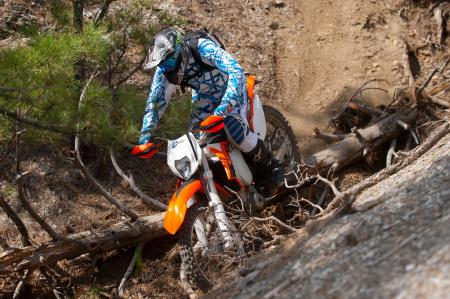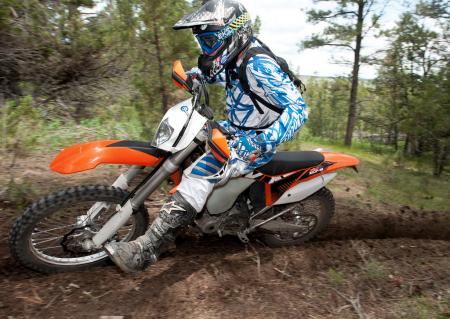 Not only is the 350 XCF-W more stable and solid feeling than KTM’s two-stroke XC models, it’s also got the best brakes in the business. |
For 2012 KTM has done the off-road conversion for you, with a wider-ratio transmission and engine modifications that make the aggressive powerband more appropriate for off-road racing. The new frame uses the non-linkage WP PDS shock, which KTM swears works better off-road. A host of improvements to the clutch, engine cases, fork, tripleclamps, rear suspension shock position and ergonomics highlight the major changes. KTM also improved the electric-start system and added a more powerful 190-watt electrical system to power FIM enduro-legal lighting. The new exhaust is spark arrested and quiet, and the tamper-proof EFI settings ensure EPA and California 'Green Sticker' compliance.
At the KTM 2012 XCF-W press launch at the Inyan Kara AMA National Enduro in Wyoming we had the chance to try all of the new KTM cross-country bikes before picking one to race. Being diehard two-stroke lovers, we thoroughly expected to choose the familiar 300XC-W to race. That opinion changed quickly when we climbed aboard the 350XCF-W. The bike felt acceptably light, handled better at speed than the two-strokes and had the smoothest powerband this side of an XR100. As the journalists swapped bikes during the day it was always the 350 that we couldn’t wait to ride again, and it became the bike the other models were judged by. With just two 350s at the media's disposal for racing we got our elbows up and smashed our way to the front of the line to book the 350XCF-W as our AMA National race bike!
What's it like? Well, hoist it onto a bike stand and you'll feel that it is only a little lighter than the 450 version. The new plastics have improved rider ergonomics, so the bike is immediately comfortable either sitting or standing. All the normal KTM-isms are apparent; KTM motorcycles have become more mainstream than ever, but they are still KTMs, meaning they feel a little different to ride and are put together with different-sized fasteners than Japanese offerings. One thing for sure, nothing about the KTM feels cheaply made, and everything is designed to be functional.
The hydraulic clutch uses a new diaphragm-type single spring, which is adjustable for preload. The light pull and progressive feel are excellent. Despite EPA-compliance, the 350 has sharp, instant throttle response and a satisfying yet quiet exhaust note. The electric starter fires the bike up pretty quickly, but to be honest, the bike starts faster when you use the kicker.
Run the 350 hard through the gears and you'll feel a little disappointed at first. There's no bottom-end hit and no surge of raw power. The 350XCF-W has a flat and featureless powerband that keeps revving long after a 450 would have signed off. Ride it back to back against the KTM250XCF-W and it's apparent the 350 makes substantially more power at all points, but never enough to be intimidating or even all that exciting. While we have ridden plenty of souped-up 250F motocross bikes that pull harder, we knew from experience that the workman-like powerband of the 350 would make it an excellent enduro race bike.
Here are some random notes from our race test at the Inyan Kara National Enduro:
-The KTM 350XCF-W gets amazing traction, thanks to that incredibly smooth powerband. The power delivery is confidence inspiring, and you always know what will happen with no surprises.
-Overrev! This bike will scream (the rev-limiter is set at 12,000 rpm) so don't waste your effort shifting out of second in the woods. There isn't much low-end torque, but it does have nice hook at the top of the powerband where it starts to breathe hard! Besides, revving it in second gear avoids the gappy-feeling second to third gear tap dance. We’d love to try the close-ratio XCF version!
-While you don't need to clutch the 350 as often as you do a 250F or a two-stroke, the lack of low-end hit does require a little zap of clutch out of corners and over surprise obstacles that a 450 would hop over with just a twitch of the throttle.
-Stability is excellent. We never thought we'd say that about a KTM, but this bike feels solid at speed. We had it buzzing too, to the tune of 80-plus mph in sixth gear a few times on the desert-like transfer trails of Inyan Kara.
-Brakes are beyond excellent. They don’t fade and are super-strong and progressive. We're chronic rear brake draggers and have overheated KTM rear brakes in the past to the point the wheel wouldn't turn. This is certainly not the case on the new 350, which never showed any signs of rear brake trouble at all. For the record, there is very little engine braking, at least when compared to a 450.
-The 350 never feels as heavy as a 450, and in fact turns just as well as the 250 in the woods. This is a comfortable all-day race bike.
-The electric starter struggles if you happen to stall the bike when it's really hot, taking a lot of cranking before the engine finally re-fires. We've noticed this with other brands of EFI 'green sticker' four-strokes as well, so perhaps it is an overly lean fuel/air setting that causes this. In any case the bike didn't stall easily and never flamed out, farted, barfed or did anything but run nicely.
-The clutch might be a little too light; a couple times, when running wide open in top gear under a heavy load, we felt it slip a little. A stiffer preload setting on the clutch diaphragm spring might help.
-The front fork is great. We never had the urge to even touch a clicker. It had great small-bump compliance and is still able to soak up bigger hits and even some abrupt jump faces without a problem.
-The rear suspension is a little better than past PDS systems, but the rear of the bike still wallows through fast sandy berms and whoops and blew through its travel on high-speed G-outs, sometimes to the point of making us nervous. When we adjusted it to soak up that stuff, the rear end kicked over roots and small logs. We slowed down the rebound and increased the compression, which helped a little, and dealt with the subsequent harshness over trail junk. We could have probably found a better setting if we’d had more time to experiment, but we have to wonder why KTM didn’t just use the shock linkage like they did on the motocross version.
So how’d we do on the 350 at Inyan Kara? Fourth in class! Would we race it again? Absolutely! The bike was gentle to ride but had enough beans for the open stretches without ever getting unruly. It felt light enough, was solid and handled well. With more time tuning the rear suspension, we’re sure it would handle better.
If this were our personal bike, we'd get a KTM suspension specialist to set up the shock for us. KTM dealers can alter the EFI for closed-course racing, and we'd do that and add a less restrictive pipe to give the powerband just a little more snap. We'd increase the clutch spring tension, add a tooth or two to the rear sprocket to help overcome the second-to-third shift gap, add a skid plate and radiator guards and go racing! We'd even use it for moto; the 350XCF-W would be a good Vet-class motocross bike, especially on rough and slippery tracks.
So who should buy this bike? Well, us, for starters. If you're a racer and a 450 is just too aggressive or big, you'll love the 350. It can't help but be more reliable than a souped up 250F and will just about hang with the 450s in the open stuff. In the woods it's fantastic, the tighter and gnarlier the trails the better. The 350XCF-W would be a fun hardcore play bike too. We love it, but if you want one you'd better stand in line behind us!





No comments:
Post a Comment